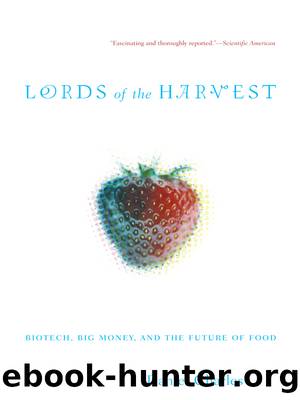Lords of the Harvest by Dan Charles

Author:Dan Charles [DANIEL CHARLES]
Language: eng
Format: epub
Publisher: Basic Books
Published: 2011-12-23T16:00:00+00:00
12
Summers of Triumph , Summers of Discord
Frank Mitchener, Jr., amateur historian, former president of the National Cotton Council, and prominent citizen of Tallahatchie County, Mississippi, works from an office that is built like a chapel or an art gallery. The wooden beams of the ceiling vault upward. The walls are white except for one, made of glass, which overlooks the green banks of a quiet stream called the Cassidy Bayou.
Drop a stick into that stream, and it will travel through countless detours a hundred miles southwest to meet the Mississippi River at the city of Vicksburg. Its route will traverse the heart of the Mississippi Delta, which is not a delta at all, strictly speaking, but a floodplain that stretches from Memphis in the north to Vicksburg in the south, from the levees along the Mississippi’s banks in the west to the edge of Mississippi’s “hill country” in the east. It is a land of legend, a birthplace of Faulknerian visions and the Blues, home to inexhaustibly rich soil, pervasive poverty, racial atrocities, and proud, aristocratic gentility.
Historian James Cobb called it “the most Southern place on earth” in 1985 and discovered only later, as he immersed himself in the area’s history, that the Delta represented not so much the Old South as the New. At the time of the Civil War the Delta was a land of forests and swamps, shunned by most as a breeding ground for disease. Only later, with the arrival of railroads and the federally financed levees along the Mississippi and its tributaries, did the Delta become the domain of “planter aristocrats.” But Cobb realized that this new elite was no traditional aristocracy, concerned more with social tradition than the aggressive pursuit of profit. The post–Civil War cotton growers of the Delta organized their plantations according to modern principles of industrial management, adopted new technology, and lobbied successfully for federal aid.
They were in every sense the ancestors of Frank Mitchener, Jr. Mitchener owns or manages somewhere between five and ten thousand acres of Delta farmland from the serene comfort of his office. Seventy years ago such an operation would have entailed supervising an army of tenant farmers or sharecroppers. Landowners in the Delta generally employed about five tenant families, each with a team of mules, for every hundred acres of cotton.
Today the tenant farmers are gone. The wooden shacks where those families used to live have vanished from the landscape but certainly not from the memories of Mitchener and others of his generation. According to the standard telling of this story, technology swept aside the sharecroppers. The mechanical harvester and chemical herbicides, it is said, eliminated the need for human hands to hoe the weeds or pick the cotton. In reality, technology was not so much the driving force as a useful tool in the service of other forces that pulled and pushed tenant farmers out of Mississippi. The process began with New Deal programs that benefited landowners at the expense of sharecroppers. It accelerated when World War II sent young men overseas, creating overnight a shortage of labor in cotton country.
Download
This site does not store any files on its server. We only index and link to content provided by other sites. Please contact the content providers to delete copyright contents if any and email us, we'll remove relevant links or contents immediately.
| Anatomy | Animals |
| Bacteriology | Biochemistry |
| Bioelectricity | Bioinformatics |
| Biology | Biophysics |
| Biotechnology | Botany |
| Ecology | Genetics |
| Paleontology | Plants |
| Taxonomic Classification | Zoology |
Sapiens: A Brief History of Humankind by Yuval Noah Harari(13036)
The Tidewater Tales by John Barth(12026)
Do No Harm Stories of Life, Death and Brain Surgery by Henry Marsh(6332)
Mastermind: How to Think Like Sherlock Holmes by Maria Konnikova(6224)
The Thirst by Nesbo Jo(5778)
Why We Sleep: Unlocking the Power of Sleep and Dreams by Matthew Walker(5636)
Sapiens by Yuval Noah Harari(4528)
Life 3.0: Being Human in the Age of Artificial Intelligence by Tegmark Max(4492)
The Longevity Diet by Valter Longo(4443)
The Rules Do Not Apply by Ariel Levy(3897)
The Immortal Life of Henrietta Lacks by Rebecca Skloot(3820)
The Body: A Guide for Occupants by Bill Bryson(3789)
Why We Sleep by Matthew Walker(3767)
Animal Frequency by Melissa Alvarez(3750)
Yoga Anatomy by Kaminoff Leslie(3696)
Barron's AP Biology by Goldberg M.S. Deborah T(3628)
The Hacking of the American Mind by Robert H. Lustig(3575)
All Creatures Great and Small by James Herriot(3506)
Yoga Anatomy by Leslie Kaminoff & Amy Matthews(3392)
